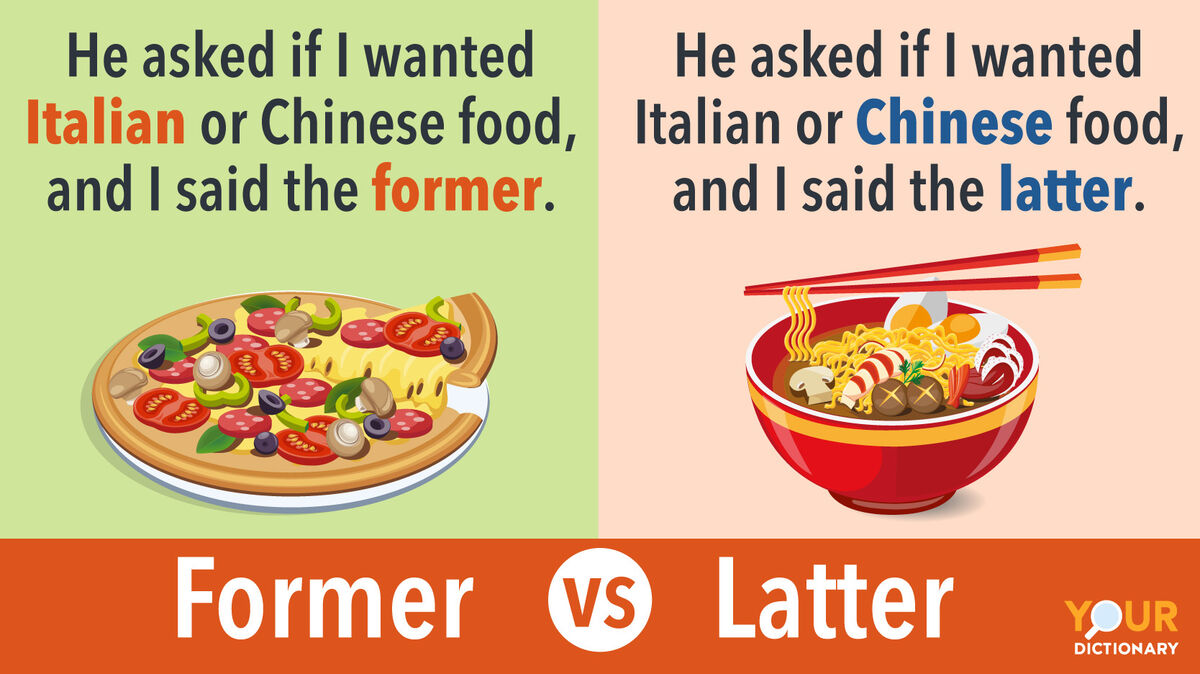
When writing former vs. latter in a sentence, it can be easy to hesitate or get confused. Thankfully, the difference between them is pretty simple to understand and remember. Explore the meanings and uses of former and latter.
The Difference Between Former and Latter
The meanings of former and latter are pretty straightforward. If you are making a comparison between two things, former comes first and latter is second. The terms can also be used separately to convey the following:
former - having previously done something or held a particular position; the first-mentioned person or thing
latter - at or near the end of something; the second-mentioned or last-mentioned person or thing
Examples and Usage of Former
The adjective former is defined as “coming before” or “in the past.” Former is often synonymous with previous, as seen in these examples:
The former president will be attending the inauguration.
My former girlfriend and I often went out to eat.
They restored the building to its former glory.
How to Remember When to Use Former
You can remember the meaning of former by recalling that it means "first," and both words begin with an “f.”
He attended his former school first, and then he started attending his current one.
Examples and Usage of Latter
The term latter means “the second of two” and is used in comparisons of two things. Latter originally comes from the Old English lætra which means “late.” It can also refer to the last thing in a sequence, the end of something or a subsequent period.
He was in his latter days.
He asked if I wanted Italian or Chinese food, and I said the latter.
I’ve been to both Rome and Florence, and I like the latter best.
How to Remember When to Use Latter
You can remember the meaning of latter by thinking of later, which comes after something. Later and latter both begin with the letter “l.”
He was invited to two parties by the Smiths and the Millers. First, he went to the former and later he went to the latter.
How to Use Former and Latter
If you use former and latter in the same sentence, there is typically a comparison of two things. Former refers to the first thing and latter refers to the second.
The Sopranos and Breaking Bad are often considered the greatest shows of all time, but I prefer the former to the latter.
They’re both great options. The former is good, but the latter is even better.
My former co-workers were difficult to work with, but the latter group was great.
Other Ways to Use Former and Latter
While former and latter are typically used to make a comparison between two things, they can be applied to larger comparisons.
She cited Collins, Bhaer and Marrilier, but she cited the latter the most. (latter refers to Marrilier, the last person listed)
He asked if she wanted the chicken, veal or salmon, and she chose the latter. (latter refers to the salmon, the last option listed)
Of the three candidates, Brown, Davis and Franklin, only the former campaigned. (former refers to Brown, the first person listed)
How to Remember the Correct Word
Now that you have a good understanding of former vs. latter, you may have questions about other commonly confused terms. For example, when should you use this vs. that or these vs. those? What about the difference between who, that and which when you’re talking about something or someone? Should you write vs. or vs? Explore all this and more, and before you know it you’ll be a master of the English language.